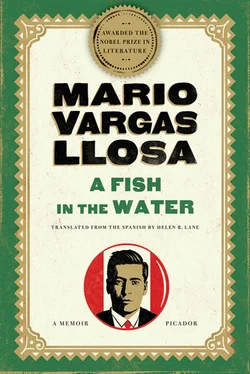Mario Vargas Llosa - A Fish in the Water - A Memoir
Здесь есть возможность читать онлайн «Mario Vargas Llosa - A Fish in the Water - A Memoir» весь текст электронной книги совершенно бесплатно (целиком полную версию без сокращений). В некоторых случаях можно слушать аудио, скачать через торрент в формате fb2 и присутствует краткое содержание. Год выпуска: 2015, Издательство: Macmillan, Жанр: Биографии и Мемуары, на английском языке. Описание произведения, (предисловие) а так же отзывы посетителей доступны на портале библиотеки ЛибКат.
- Название:A Fish in the Water: A Memoir
- Автор:
- Издательство:Macmillan
- Жанр:
- Год:2015
- ISBN:нет данных
- Рейтинг книги:3 / 5. Голосов: 1
-
Избранное:Добавить в избранное
- Отзывы:
-
Ваша оценка:
- 60
- 1
- 2
- 3
- 4
- 5
A Fish in the Water: A Memoir: краткое содержание, описание и аннотация
Предлагаем к чтению аннотацию, описание, краткое содержание или предисловие (зависит от того, что написал сам автор книги «A Fish in the Water: A Memoir»). Если вы не нашли необходимую информацию о книге — напишите в комментариях, мы постараемся отыскать её.
is a twofold book: a memoir of one of Latin America's most celebrated witers, beginning with his birth in 1936 in Arequipa, Peru; and the story of his organization of the reform movement which culminated in his bid for the Peruvian presidency in 1990.
A Fish in the Water: A Memoir — читать онлайн бесплатно полную книгу (весь текст) целиком
Ниже представлен текст книги, разбитый по страницам. Система сохранения места последней прочитанной страницы, позволяет с удобством читать онлайн бесплатно книгу «A Fish in the Water: A Memoir», без необходимости каждый раз заново искать на чём Вы остановились. Поставьте закладку, и сможете в любой момент перейти на страницу, на которой закончили чтение.
Интервал:
Закладка:
I was in Punta Sal with Patricia and my children, to spend the national holiday week there, far from winter in Lima. We had returned to Peru not long before from London, where, for some time now, we were in the habit of spending three months or so every year, and I had intended to take advantage of the stay in Punta Sal to correct the proofs of my latest novel, El hablador ( The Storyteller ), between dips in the ocean and to practice, from morning to night, the solitary vice: reading, constantly reading.
I had turned fifty-one in March. Everything seemed to indicate that my life, an unsettled one since the day I was born, would go by more calmly from now on: spent between Lima and London, and devoted exclusively to writing, with a stint of university teaching every so often somewhere in the United States. Now and again I scribble in my memo books a few work plans for the immediate future, ones that I never carry out altogether. When I reached fifty, I had dreamed up the following five-year plan:
1) A play about a little old Quixote-like man who, in the Lima of the 1950s, embarks on a crusade to save the city’s colonial-era balconies threatened with demolition.
2) A novel, something between a detective story and a fictional fantasy, about cataclysms, human sacrifices, and political crimes in a village in the Andes.
3) An essay on the gestation of Victor Hugo’s Les Misérables .
4) A comedy about a businessman who, in a suite in the Savoy Hotel in London, meets his best friend from his school days, whom he has thought dead, but who has now turned into a good-looking woman, thanks to hormones and surgery; and
5) A historical novel inspired by Flora Tristan, the Franco-Peruvian revolutionary, ideologist, and feminist, who lived in the first third of the nineteeth century.
In the same memorandum book I had also jotted down, as less urgent projects, learning that devilishly difficult language, German; living for a while in Berlin; trying yet again to get through books that had always defeated me — such as Finnegans Wake and The Death of Virgil ; going down the Amazon from Pucallpa to Belém do Pará in Brazil; and bringing out a revised edition of all my novels. Other vague projects of a less publishable nature also figured on the list. The one thing that wasn’t even hinted at anywhere in these notes was the activity that, through the caprice of the wheel of fortune, was about to monopolize my life for the next three years: politics.
I didn’t have the least inkling that that would be so, on that 28th of July, at noon, when we prepared to listen, on my friend Freddy Cooper’s little portable radio, to the speech that the president of the Republic delivers in person to Congress on the national holiday. Alan García had been in office for two years and was still very popular. To me, his politics seemed like a time bomb. Populism had been a catastrophic failure in Allende’s Chile and in Siles Suazo’s Bolivia. Why would it go over well in Peru? Subsidizing consumption, in a country like Peru that depends on imports for a large share of its food and its industrial components, brings with it a deceptive bonanza that lasts only as long as the country has reserves of foreign currency available to allow the flow of incoming goods to be maintained. This was how things had gone so far, thanks to a massive expenditure of foreign currency reserves, which had increased owing to the government’s decision to spend only 10 percent of the money earned by exports in servicing the country’s foreign debt. But this policy was beginning to give signs of having been run into the ground. The country’s reserves were being depleted; because of its confrontation with the International Monetary Fund and the World Bank — the bêtes noires of the speeches delivered by President García — Peru had seen all the doors of the international financial system slam shut; the printing of paper money with no backing so as to cover the fiscal deficit was making inflation worse; the dollar, maintained at an artificially low price, was increasingly discouraging exports on the one hand and encouraging speculation on the other: the best deal for a businessman was to get an import license that allowed him to pay for what he ordered from abroad with cheap dollars (there were any number of rates of exchange for the dollar, depending on the “social necessity” of the product). The traffickers in contraband goods saw to it that the products thus imported — sugar, rice, medicine — passed through Peru as fast as if over hot coals and went on to Colombia, Chile, or Ecuador, where their prices were not controlled. The system had enriched a handful of people but had plunged the rest of the country’s population into poverty that was increasing by the day.
The president did not appear worried. Or so it seemed to me at least, a few days earlier, during the only interview I had with him while he was in power. When I arrived from London, at the end of June, he sent one of his aides-de-camp to welcome me back, and as protocol required, I went to the Presidential Palace to thank him for the courtesy. He received me personally and we talked together for about an hour and a half. Standing in front of a blackboard, he explained to me his goals for the current year and showed me a handmade bazooka, put together by Sendero Luminoso — Shining Path, the Maoist guerrilla movement — with which terrorists had fired a projectile on the palace from Rímac. He was young, self-assured, and likable. I had seen him only once before, during the election campaign, at the home of a mutual friend — Manuel Checa Solari, the auctioneer and art collector — who was bent on our having lunch together. The impression García gave me then was that of a young man of limitless ambition capable of anything if it would bring him to power. For that reason, a few days after that first meeting, I said on two television interviews conducted by the journalists Jaime Bayly and César Hildebrandt that I would vote not for him but for the candidate of the PPC (the Partido Popular Cristiano: the Christian Popular Party), Luis Bedoya Reyes. Despite that fact, and despite an open letter that I wrote to him when he had been in power for exactly a year, condemning him for the massacre of the rioters in the Lima prisons in June of 1986, *he did not seem to bear me any ill will that morning at the Presidential Palace, for his attitude toward me was warm and friendly. At the beginning of his term in office he had sent word to me to ask if I would accept the ambassadorship to Spain, and now, even though he knew how critical I was of his policies, the conversation could not have been more cordial. I remember having said to him, jokingly, that it was a shame that having had the chance to be the Felipe González of Peru he was determined to be our Salvador Allende, or, worse still, our Fidel Castro. Wasn’t the world headed in other directions?
Naturally, among all the things I heard from him that morning concerning his immediate political plans, the most important subject of all didn’t come up — a measure that at the time he had already cooked up with a group of intimates, and that Peruvians first heard of by way of that speech on the 28th that Freddy and I heard, with García’s voice broken and crackling on that ancient radio beneath the burning-hot sun of Punta Sal: his decision to “nationalize and bring under government control” all banks, insurance companies, and financial institutions in Peru.
“Eighteen years ago I learned in the daily papers that Velasco had taken my country estate away from me,” a gentleman already well along in years, in a bathing suit and with an artificial hand hidden by a leather glove, exclaimed. “And now, from this little radio I learn that Alan García has just taken my insurance company away from me. That’s quite something, wouldn’t you say, my friend?”
Читать дальшеИнтервал:
Закладка:
Похожие книги на «A Fish in the Water: A Memoir»
Представляем Вашему вниманию похожие книги на «A Fish in the Water: A Memoir» списком для выбора. Мы отобрали схожую по названию и смыслу литературу в надежде предоставить читателям больше вариантов отыскать новые, интересные, ещё непрочитанные произведения.
Обсуждение, отзывы о книге «A Fish in the Water: A Memoir» и просто собственные мнения читателей. Оставьте ваши комментарии, напишите, что Вы думаете о произведении, его смысле или главных героях. Укажите что конкретно понравилось, а что нет, и почему Вы так считаете.












